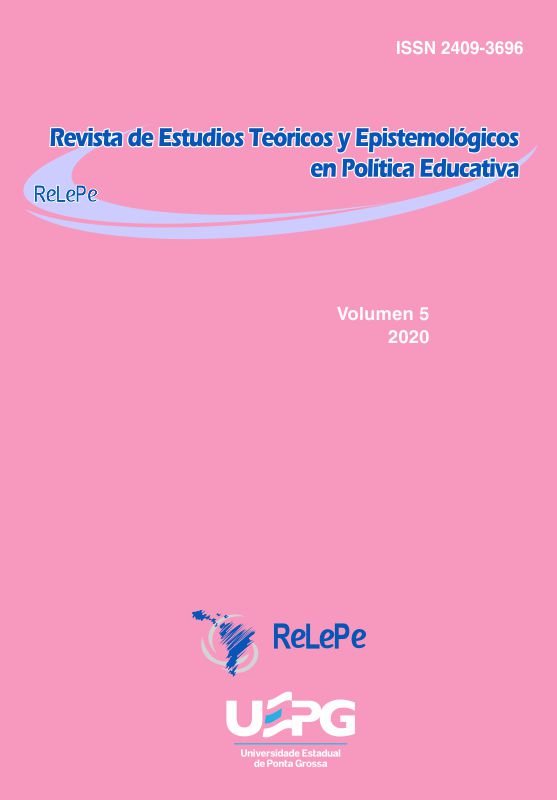Political education against inequalities and citizenship for democracy: international scientific literature review after twenty years of neoliberalism (1999-2019)
DOI:
https://doi.org/10.5212/retepe.v.5.16900.021Abstract
This paper discusses the role of citizenship and political education in the contemporary society. It analyses the consequences of neoliberalism regarding its assault on the social sphere and its production of mass inequality around the world. We initiate the conversation by making education central to politics, culture as the key tool that helps us to analyze the meanings of citizenship. The privatization of citizenship narrows the debate around the role of the citizen, the public sphere and undermines democratic values. The goal of this research is to try and understand whether political education can reduce social inequality or not, and how the presence of an informed and politically engaged culture helps create the agents necessary for a substantive democracy. The chosen method enables the production of an international literature review with a systematic bibliographic search, exploring the meanings and scientific uses of the categories Political Education, Social Inequality, Citizenship and Democracy after many years under the neoliberalism hegemony around the globe. This research was conducted via the following databases: Google Scholar; Networked Digital Libraries of Theses and Dissertations (NDLTD); Education Research and Information Center (ERIC) and Scientific Electronic Library Online (SciELO). It includes papers written in English, Spanish and Portuguese which publishing dates range from 1999 to 2019. A total of 51 articles were selected to compose the analytic corpus (n=51). After reading all of the texts and making a content analysis, the results were presented in 3 categories: i - Citizenship education and political education: theories and practices (Conceptual approaches on citizenship and Students’ capacity for political or moral reasoning fostered by political education); ii - Politics, human rights & democratic values in education (Critical approaches of human rights or democratic values on higher education; Popular education or citizen participation on political education and Politics as a teaching or learning tool for formal education); iii - Relationships among State, citizens and civil society (Positive relationships in contemporary societies and Conflicts in adult education). Under neoliberalism, civic culture, democratic values and informed dialogue atrophied. Clearly, this is partly due to the dominant neoliberal view that social agency is dangerous and needs to be shaped by neoliberal forms of education. Under the reign of neoliberalism, there has emerged a pedagogical machinery of power engaged in producing a culture of manufactured ignorance that works to produce a form of political repression. However, as an alternative, many pieces of research are arguing that education must empower citizens to engage in their communities as a method to learn, engage in individual and collective action, and how to participate in political struggles and public affairs. Political education can be an important social movement against the inequalities. That seems to be crucial for building a direct and participative citizenship in our contemporary democracy.
Keywords: Political Education. Social Inequality. Citizenship. Democracy. Neoliberalism.
Downloads
Metriken
Downloads
Veröffentlicht
Zitationsvorschlag
Ausgabe
Rubrik
Lizenz
1. Autores mantém os direitos autorais e concedem à revista o direito de primeira publicação, com o trabalho simultaneamente licenciado sob a Licença Creative Commons Atribuição 4.0 Internacional que permite o compartilhamentodo trabalho com reconhecimento da autoria e publicação inicial nesta revista.2. Autores têm autorização para assumir contratos adicionais separadamente, para distribuição não-exclusiva da versão do trabalho publicada nesta revista (ex.: publicar em repositório institucional ou como capítulo de livro), com reconhecimento de autoria e publicação inicial nesta revista.
3. Autores têm permissão e são estimulados a publicar e distribuir seu trabalho online (ex.: em repositórios institucionais ou na sua página pessoal) a qualquer ponto antes ou durante o processo editorial, já que isso pode gerar alterações produtivas, bem como aumentar o impacto e a citação do trabalho publicado (Veja O Efeito do Acesso Livre).
__________
Los autores que publican en esta revista están de acuerdo con los siguientes términos:
1. Los autores conservan los derechos de autor y garantizan a la revista el derecho de ser la primera publicación del trabajo al igual que licenciado bajo una licencia de Creative Commons Reconocimiento 4.0 Internacional que permite a otros compartir el trabajo con un reconocimiento de la autoría del trabajo y la publicación inicial en esta revista.
2. Los autores pueden establecer por separado acuerdos adicionales para la distribución no exclusiva de la versión de la obra publicada en la revista (por ejemplo, situarlo en un repositorio institucional o publicarlo en un libro), con un reconocimiento de su publicación inicial en esta revista.
3. Se permite y se anima a los autores a difundir sus trabajos electrónicamente (por ejemplo, en repositorios institucionales o en su propio sitio web) antes y durante el proceso de envío, ya que puede dar lugar a intercambios productivos, así como a una citación más temprana y mayor de los trabajos publicados (Véase The Effect of Open Access) (en inglés).
__________
If the article is accepted for publication, copyright of this article will be vested in the The Journal of Theoretical and Epistemological Studies on Education Policy.

Este obra está licenciado com uma Licença Creative Commons Atribuição 4.0 Internacional.

This work is licensed under a Creative Commons Attribution 4.0 International License.

Este obra está bajo una licencia de Creative Commons Reconocimiento 4.0 Internacional.





